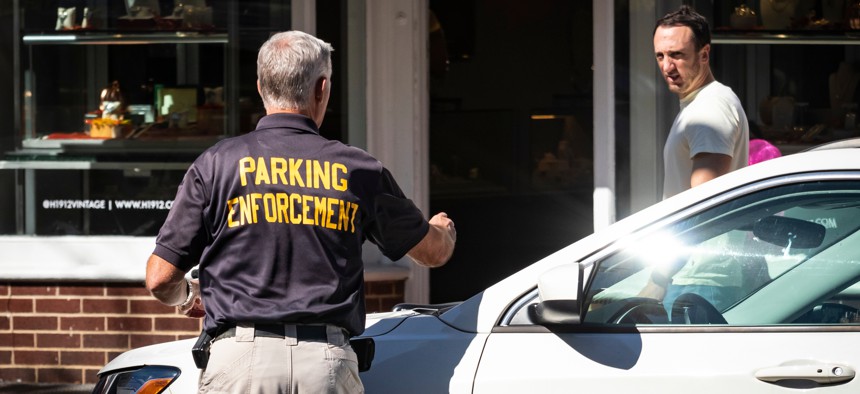For Cities, Less Traffic Means Lost Revenue

Shutterstock/ Benjamin Clapp
Cities have seen parking fee and traffic fine collections drop during the pandemic as commuters and tourists stay home and enforcement is relaxed.
Sluggish tax collections have dragged down city revenues during the coronavirus pandemic, but a decline in parking fees and fines is also posing a problem for several cities where tourism and commuting have dropped off.
In Washington, D.C., traffic tickets make up about 2% of the city’s locally generated revenue, but money collected from traffic violations has declined precipitously, according to financial estimates provided by the Chief Financial Officer. The city collected $68 million in non-automated parking fines in Fiscal 2019. That figure declined to $36 million in Fiscal 2020 and is estimated to drop to $4 million in Fiscal 2021, according to data provided by the CFO’s office.
The non-automated fines are “expected to decline significantly as there are fewer commuters and less traffic,” according to a recent CFO report. Tickets issued by the city’s network of traffic enforcement cameras have also declined, with revenue predicted to drop from $123 million in Fiscal 2019 to $100 million in Fiscal 2021, according to the CFO.
In addition to having fewer drivers to ticket, the city has also stopped issuing tickets for certain types of violations, such as for expired meters or expired license plates. A spokesman for the District’s Department of Motor Vehicles confirmed the city is currently only ticketing for 47 safety violations, including parking in front of a fire hydrant.
“The District government is currently reviewing whether parking meter enforcement should be restarted in commercial areas,” DMV spokesman James Miller said in an email. “However, since no decision has been made, all tickets remain in their current status for the duration of the public health emergency, with no additional penalties applied.”
Chicago saw a 52% decline in the number of parking tickets issued by the city last year after Mayor Lori Lightfoot similarly ordered the city to stop ticketing and booting illegally parked vehicles unless it’s for a public safety reason.
Less parking enforcement has in some cases also led to reduced workforce needs.
In Washington, D.C., a handful of the city’s parking enforcement officers have been detailed to other government programs, with some assisting at Covid-19 testing sites. Thirteen of the city’s 242 parking officers are detailed, Miller said.
Miami Beach, Florida also had to scale back the size of its parking enforcement office after garage and street meter fee collection declined by more than 90% at the outset of the pandemic.
The city is down to 15 full time parking enforcement officers from a staff of 28 full-time and 27 part-time officers, said Monica Beltran, the assistant director of the Miami Beach Parking Department. Some parking officers were able to find jobs elsewhere in city government. But the city’s parking department is self-funded through its fee collection and had little choice but to cut expenses when its revenues tanked, Beltran said.
With hotels, bars, entertainment venues and restaurants shut down at the outset of the pandemic, the tourism-dependent city had few visitors or workers paying to park at street meters or in the 12 city-run garages. To allay concern about transmission of the virus though high-touch surfaces, the city also removed 750 parking meter pay stations and transitioned to an app-based system, Beltran said.
Parking revenues have started to bounce back as businesses have been allowed to reopen—with Miami Beach now collecting about 65% of its average weekly parking fees. Even with the drop in revenue collection, the city expects to maintain a 50% cap on parking garage capacity during the spring break season to prevent the area from becoming a hot spot for virus transmission, Beltran said.
“Those measures affect our bottom line but they are necessary,” she said. “The demand is there but you have to do the right thing. If you open the doors, it could become a free for all.”
Andrea Noble is a staff correspondent with Route Fifty.
NEXT STORY: States to Recoup More Covid Costs From Feds Under Biden Reimbursement Plan





